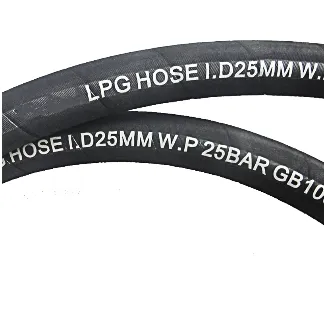335345435
Aug . 07, 2025 10:56 Back to list
LPG Hose: Choosing the Right Hose for Safe, Reliable Gas Transfer
Whether you're installing a commercial cooking system, connecting a household cylinder, or managing an industrial propane distribution setup, a quality LP gas hose is a safety-critical component. It’s not just a tube—it’s the frontline defense against gas leaks, flameouts, and dangerous pressure drops.
If you're looking for LPG hose for sale, comparing specs, or researching LPG hose price variations, this guide will help you understand what matters: hose types, materials, certifications, use cases, and sourcing.

What Is an LPG Hose?
An LPG hose (or LP gas hose) is a flexible, pressure-rated hose designed specifically for the transfer of liquefied petroleum gas—commonly propane or butane. These hoses are built to withstand exposure to gas, UV, ozone, outdoor weathering, and occasional contact with oils or chemicals.
LPG hoses are used in a variety of applications:
Gas stoves and ovens
Barbecue grills
Patio heaters
Forklift fuel lines
Portable gas heaters
Industrial burners
Caravan and RV systems
Key Features of a Good LP Gas Hose
A high-quality LPG hose must meet specific standards for performance and safety. Key features include:
Gas-resistant inner tube: Usually synthetic rubber (NBR or CR)
Textile or wire reinforcement: To handle working pressures of 20–30 bar (290–435 psi)
Flame-retardant outer cover: Resists sparks and radiant heat
Flexibility: For easy routing, coiling, or movement during use
Standard fittings: Compatible with regulators, burners, or appliances
Certifications: UL, EN 559, ISO 3821, or national gas board approvals
Some hoses are also rated for both vapor and liquid phase LPG, making them suitable for refueling operations or cylinder-to-appliance connections.
LPG Hose Types by Application
There are different types of LP gas hose based on where and how they’re used:
1. Low-Pressure LPG Hose (Up to 2 bar)
Common in domestic gas appliances
Soft, flexible
Often pre-fitted with regulators and clips
2. Medium-Pressure LPG Hose (2–10 bar)
Used in portable heaters or small commercial kitchens
Must be reinforced with textile braid
3. High-Pressure LPG Hose (10–30+ bar)
For industrial burners, forklifts, and mobile fueling systems
Typically double-reinforced and crimp-fitted
4. Composite or Multi-Layer LPG Hoses
Designed for very high safety in mobile tankers or refilling setups
Include antistatic wires, chemical barriers, and pressure sensors
Common Hose Sizes
|
Inner Diameter |
Typical Use Cases |
|
6 mm (1/4") |
Domestic stoves, small appliances |
|
8 mm (5/16") |
Grills, space heaters |
|
10 mm (3/8") |
Commercial burners, RV hookups |
|
13 mm (1/2") |
Forklifts, large heaters, mobile units |
|
16–25 mm |
High-flow or industrial systems |
Lengths typically range from 1 to 50 meters, with most home and appliance hoses sold in 1–5 meter segments.
LPG Hose Price: What to Expect
LPG hose price depends on several factors:
|
Price Factor |
Details |
|
Hose diameter |
Larger ID = higher material and strength costs |
|
Working pressure rating |
Higher pressure = more layers and testing |
|
Length |
Sold by meter or as pre-assembled kits |
|
Fittings |
Crimped brass, stainless, or clamp-on |
|
Certifications |
UL, ISO, or EN standards add compliance cost |
|
Brand & origin |
Branded hoses (e.g., Cavagna, Parker, Goodyear) cost more than unbranded imports |
Estimated 2025 LPG Hose Prices (USD):
|
Hose Type |
Price Range (USD/meter) |
|
6 mm low-pressure hose |
$0.80 – $1.50 |
|
8 mm medium-pressure hose |
$1.50 – $2.80 |
|
10 mm heavy-duty hose |
$2.50 – $4.00 |
|
13 mm high-pressure hose |
$3.00 – $6.00 |
|
Fitted hose (2m with clamps or ends) |
$5 – $15 total |
Bulk purchases (50m rolls or full coils) typically bring down the per-meter cost significantly, often by 20–30%.
Where to Find LPG Hose for Sale
You can buy LPG hoses for sale through several trusted channels:
1. Gas Equipment Dealers
Certified products for domestic or commercial use
Compatible fittings for your regulator or appliance
Often provide pre-assembled kits for plug-and-play setups
2. Industrial Hose Suppliers
Custom-length hoses with factory crimped ends
High-pressure and long-length options
ISO or EN-compliant for commercial kitchens or gas plants
3. Online B2B Marketplaces
Suitable for bulk orders, resellers, or branded sourcing
Check for third-party certification before purchasing
4. OEM Hose Manufacturers
For appliance builders, caravan manufacturers, or gas appliance brands
Custom print, branding, or packaging options available
LPG Hose FAQs
Q1: Can I use a garden hose for LPG?
A: Absolutely not. Garden hoses are not gas-tight or pressure-rated. Only use certified LPG hoses that resist fuel and pressure buildup.
Q2: How often should I replace my LP gas hose?
A: For household use: every 3–5 years or sooner if you see wear. Commercial hoses should be inspected monthly and replaced at the first sign of cracking, stiffness, or leakage.
Q3: What fittings work with LPG hoses?
A: Brass, stainless steel, or zinc-plated steel. Fittings vary by country (BSP, NPT, G-thread, etc.), so match your regulator and appliance port carefully.
Q4: Is there a difference between propane and LPG hoses?
A: No significant difference—LPG includes propane and butane, and hoses are rated for both. Just ensure the hose is compatible with the phase (vapor or liquid).
Q5: Can I buy LPG hose rolls in bulk?
A: Yes. Most suppliers offer 50m or 100m coils and volume pricing for wholesalers, OEMs, or contractors.
-
LPG Hose: Choosing the Right Hose for Safe, Reliable Gas Transfer
NewsAug.07,2025
-
Industrial Hose: Types, Applications, and Where to Find Reliable Suppliers
NewsAug.07,2025
-
Hydraulic Hose Pipe: Types, Pricing, and How to Source the Right One
NewsAug.07,2025
-
Hydraulic Fittings: Types, Customization, and Where to Source Them
NewsAug.07,2025
-
High Pressure Washer Hoses: Buying Guide, Specs, and Supplier Insights
NewsAug.07,2025
-
Choosing the Right Gasoline Hose: Flexibility, Resistance, and Supply Options
NewsAug.07,2025



